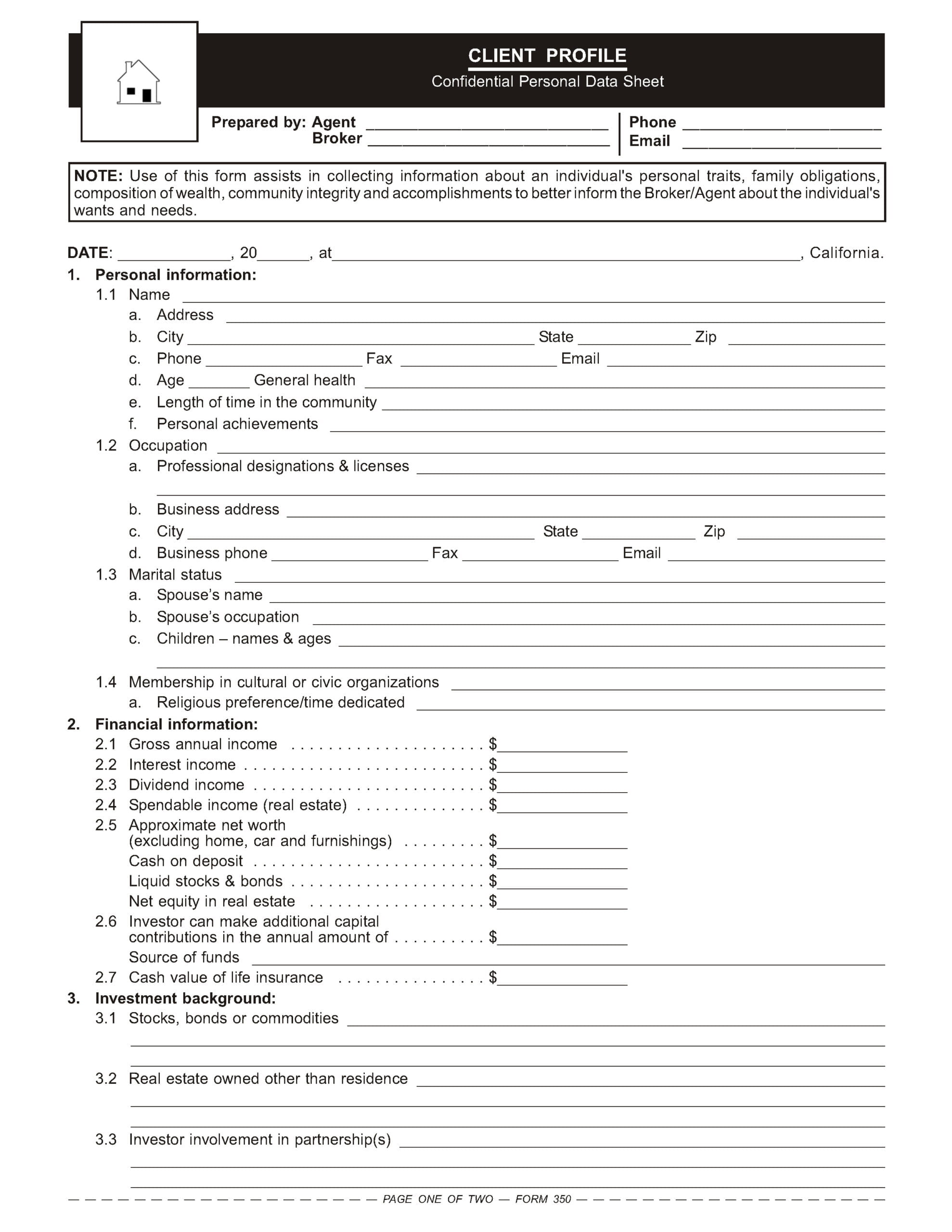This form is used by an agent when collecting information about a prospective real estate investor’s personal traits, family obligations, longevity in the community, civic involvement, personal accomplishments and composition of accumulated wealth, to determine the individual’s investment needs and how best to achieve them.
Analyzing the characteristics, attributes and motivations of your group investors
During the 2023-2024 years of transition from a seller’s market into a full-fledged buyer’s market, brokers who influence potential investors considering long-term income and wealth from real estate ownership need to consider forming groups of cash-heavy individuals to acquire income property at prices only available at a proper capitalization (cap) rate during a buyer’s market.
The buyer’s market is shaping up quickly, and will on its full arrival, run for around 24 to 30 months, around 2025-2027. It will dissipate with the arrival of the seller’s market of constantly diminishing cap rates ending in a boom-time event.
To that end, a broker pivoting into our new 2023 to, say, 2030 economy cycle, who takes on fee-based activities as a proactive syndicator, collects information regarding the attributes of each potential investor they intend to solicit to join in their purchase and joint ownership of a specific parcel of income-producing real estate.
Likewise, investors are generally cautious and selective when they consider entrusting a real estate broker with the ongoing management of the capital they contribute. Before agreeing to invest, most prudently perform some degree of background investigation into the professional history and character of the broker.
A broker exercising the opportunity option of syndication as prices bottom, begins with an analysis of character types for selection and solicitation of qualified investors. Investor profiling allows a broker to enhance their chances for long-term success in their investment programs.
An investor who might interfere with the broker’s management of either the property acquired or the group of investors assembled is to be avoided. The broker has the expertise, not the investors who, when they have the expertise, invest on their own, not with a group.
Personal information on potential investors is typically compiled by the broker over time. It is retained on an investor profile form prepared on each potential investor. The completed forms are placed on file in a database of prospective investors accessible for future reference and review. [See RPI Form 350]
Before soliciting investors for a particular property acquisition, the broker needs to set a limit on the number of members they would like to participate in the program. Though the exact number of participants is up to the broker, three to six cash investors is generally the preferred range to best assure control.
The selection of investors
When soliciting investors, the broker considers each individual’s financial capacity and long-term propensity to stay with an investment in real estate. When a prospective investor has cash but is not creditworthy, the investor is likely unreliable as a long-term participant due to potential future demands on their invested capital needed to satisfy creditors.
Also, when additional contributions are later needed to carry the limited liability company (LLC) through a foreseeable cyclical negative-cash-flow period, the financially unstable investor is more likely to be unable or unwilling to further contribute to sound long-term investment.
When selecting prospective investors, brokers are advised to be skeptical of any investor who appears to be disinclined to compensate the broker for their promotional and administrative activities. This indicates the potential investor likely mistrusts the broker and views the investment as suspect — an initially negative first impression that is difficult to overcome.
As a contributing member in an LLC, the suspicious investor is more likely to later blame the broker for an adverse cyclical period in local market conditions and be unwilling to remain in the investment or contribute additional capital as necessary on a call from the broker.
The broker selects investors who are:
- objective and rational in their approach to problem solving and not prone to act on their emotions, thus, gold bugs are out;
- goal-oriented when analyzing the broker’s expectations for long-term ownership and operation of the property, thus they will look forward into the likely economic future for the property;
- willing to commit their capital and share earnings (or losses) of ownership as a group, an acknowledged joint effort to develop wealth collectively from the start;
- willing to leave the day-to-day management of the program to the broker, as authorized by the operating agreement and the property management agreement [See RPI Form 372 and 590]; and
- willing to provide the broker with a fair and competitive amount of compensation in ownership for selection and contracting to purchase the property to be acquired, and cash fees for their organization of the investors and ongoing property and group management efforts.
A group of investors from comparable backgrounds is more likely to produce a smooth-running investment program despite cyclical shifts in the economy. Socioeconomic similarity between investors safeguards against inconsistent investment attributes, behavior and expectations. This is the affinity aspect of kinship which holds a group together to achieve investment goals.
Investor characteristics to avoid
Some prospective investors possess characteristics that are not accommodating or desirable in an LLC syndication real estate investment program.
The broker accordingly avoids prospective investors who demonstrate:
- an improper emotional makeup to remain in a long-term investment, based on an evaluation of an individual’s anger, disgust or surprise, and whether they are tense, nervous, stressed or upset;
- a suspicious or nit-picking (micro-managing) attitude that conflicts with the profit-sharing, joint-venture culture of a group investment program, manifested by asking detailed questions about the broker’s day-to-day operations of the property that appear designed to “catch” you in inconsistent explanations rather than honestly trying to better understand the long-term risks of loss the real estate or the economy may present for the investment; or
- an excessive concern for the modus operandi of the broker, not the economics of the investment opportunity presented, making inquiries with what seems like an intention to learn enough from the broker about the process of their property selection, analysis and acquisition, and the organizational requirements for forming an investment group to enter the real estate investment field themselves — entirely independent of the broker.
The client profile contents
A broker uses the Client Profile — Confidential Personal Data Sheet published by Realty Publications, Inc. (RPI) when collecting information about a prospective real estate investor’s personal traits, family obligations, longevity in the community, civic involvement, personal accomplishments and composition of accumulated wealth. The form helps the broker determine the individual’s investment needs and how best to achieve them. [See RPI Form 350]
The Client Profile — Confidential Personal Data Sheet documents the investor’s:
- personal information [See RPI Form 350 §1];
- financial information [See RPI Form 350 §2];
- investment background [See RPI Form 350 §3];
- investment needs [See RPI Form 350 §4];
- advisors [See RPI Form 350 §5];
- educational background [See RPI Form 350 §6];
- special interests [See RPI Form 350 §7];
- personality traits [See RPI Form 350 §8]; and
- relationship with broker. [See RPI Form 350 §9]
Form navigation page published 05-2023.
Form last revised 2011.
Form-of-the-Week: Client Profile and LLC Subscription Agreement — Forms 350 and 373
Form-of-the-Week: Client Profile — Confidential Personality Data Sheet — Form 350
Article: MLO recession survival guide Part 4: Arranging mortgage originations for investors
Blog: Millennials and Gen Z are your next property investor clients












